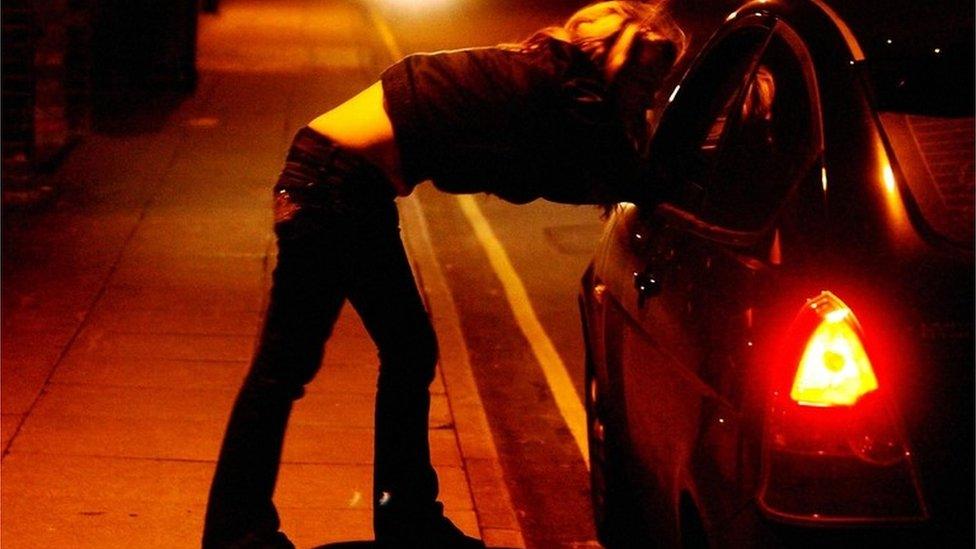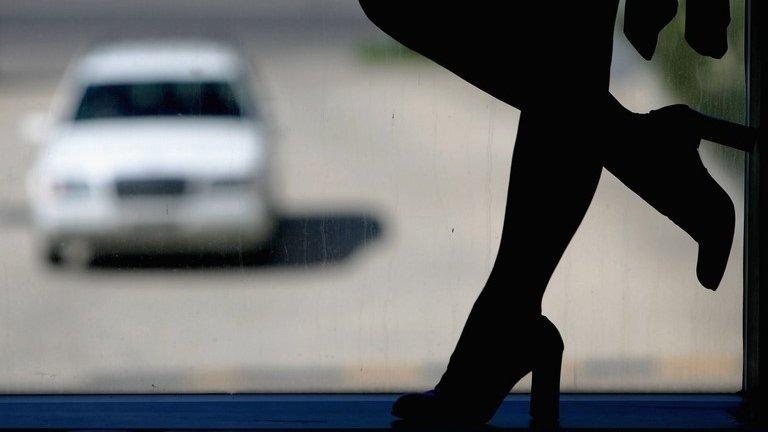Soliciting by sex workers should not be a crime, MPs say
- Published

Soliciting by sex workers should no longer be a crime, the Commons Home Affairs Select committee says.
The cross-party group of MPs is urging the government to make radical changes to the laws on prostitution in England and Wales.
Brothel-keeping rules should also be modified so that prostitutes can share premises rather than risk working alone, the committee said.
The Home Office said it would carefully consider the recommendations.
The MPs also called for previous convictions and cautions for prostitution to be deleted from sex workers' records, saying it created an insurmountable barrier for those wishing to move into "regular" work.
Their interim report, external said laws should be changed immediately but stressed that powers to prosecute people who use brothels to control or exploit sex workers should be kept.
In England, Wales and Scotland, selling and paying for sex is not against the law but many activities linked to it, such as brothel-keeping, kerb-crawling and soliciting sex in a public place, are outlawed.
In 2014, Northern Ireland became the first part of the UK to pass legislation making the purchase of sexual services illegal.

Analysis
By Danny Shaw, BBC home affairs correspondent
If the Home Affairs committee had chosen to sit on the fence over what Keith Vaz, the chairman, says is a "polarising" subject, few would have blamed them.
Prostitution raises complex moral, social and legal issues that successive governments have shied away from confronting.
Instead the MPs have been bold, coming down firmly on the side of decriminalisation. They have not closed the door on a "sex buyer's law" either, simply saying they need to assess the impact of that approach in other countries, including Northern Ireland and France.
However, the chances of the recommendations being acted on are slim: the government is in flux and when the leadership question is settled there are likely to be other priorities for the Home Secretary, whoever that may be.

The committee raised concerns that treating soliciting as an offence can prevent sex workers from seeking help to leave prostitution, and expose them to abuse and violence.
It added that the current law on brothel-keeping means some are often too afraid of prosecution to work together at the same location and as a result often compromise their safety by working alone.
Labour MP Keith Vaz, who chairs the committee, said there was "universal agreement" that elements of the present law are unsatisfactory.
"Treating soliciting as a criminal offence is having an adverse effect, and it is wrong that sex workers, who are predominantly women, should be penalised and stigmatised in this way," he said.
The committee said it would continue its inquiry by looking at whether laws on buying sex should also be changed.
It said it was seeking further evidence on the impacts of the recently introduced sex buyer laws in Northern Ireland and France, and models of regulation used in New Zealand, and other parts of Europe to make a better assessment for its final report.

Paying for sex

The Home Affairs Select committee report said:
Around 11% of British men aged 16-74 have paid for sex on at least one occasion - that's 2.3m people
The number of sex workers in the UK is estimated to be around 72,800, with about 32,000 working in London
Sex workers have an average of 25 clients per week paying an average of £78 per visit
In 2014-15, there were 456 prosecutions of sex workers for loitering and soliciting
An estimated 152 sex workers were murdered between 1990 and 2015
There were 1,139 victims of trafficking for sexual exploitation in 2014 and 248 in April to June 2015 (following the implementation of the Modern Slavery Act 2015)
In 1999, Sweden became the first country to introduce a model which criminalised buying sex - but not selling it

An attempt by former Labour Home Office minister Fiona Mactaggart to change the law to criminalise paying for sex was defeated in 2014.
Sex workers had criticised the proposal, saying criminalising their clients will make their work more dangerous.
Laura Watson, of the English Collective of Prostitutes, called for "an immediate moratorium on arrests, raids and prosecutions".
She added: "Civil orders against street based sex workers such as Section 35 dispersal orders must also be abolished and the Home Office should withdraw from cases we are fighting, where Romanian sex workers are facing deportation on grounds that sex work is not a 'legitimate form of work'."
Karen Bradley, minister for preventing abuse, exploitation and crime, said: "The government is committed to tackling the harm and exploitation that can be associated with prostitution, and believes that people who want to leave should be given every opportunity to find routes out.
"We need to ensure the law enables the police and others to tackle these harms, and target those who exploit vulnerable people involved in prostitution.
"We will carefully consider the recommendations made by the Home Affairs Select committee inquiry and respond in due course."

What does the law say about paying for sex in the UK?
Often referred to as kerb crawling, it is illegal to approach someone in a public place to ask for their services as a prostitute
It is also illegal to persistently approach people in a public place to offer to sell them sexual services
But you are allowed to pay for sex if the person is over 18 and hasn't been forced into prostitution, apart from in Northern Ireland
Renting or allowing the use of your property as a brothel is forbidden

- Published4 March 2016

- Published6 May 2015

- Published11 August 2015
